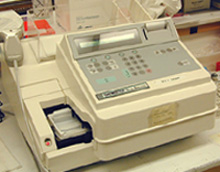- Always interpret a urinalysis in light of the clinical history.
- If things don't jive, there's probably a good reason.
- You have to give the dipstick tests a chance to work.
- There's a time window for accurate interpretation.
- You can't read the little squares too late or too soon.
- The container will tell you your window of opportunity.
- Never use outdated dipsticks. When they go bad, they're done for.
- Dipsticks that have gotten wet are going to give unreliable results.
- When in doubt, repeat the test. Look at yourself if need be.
|

|
OK, I'm getting it, by the way who helped you make this educational unit? Back